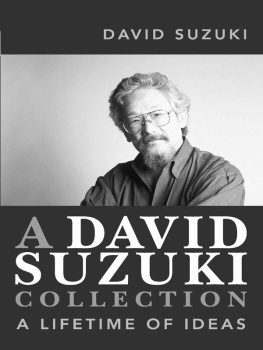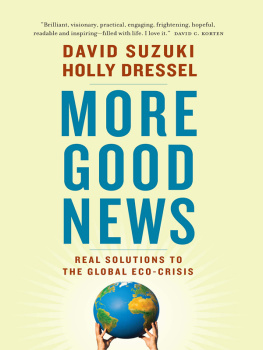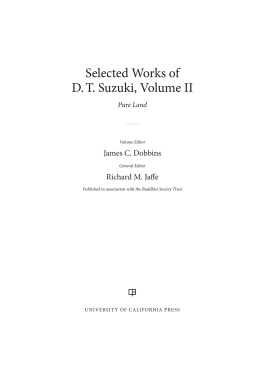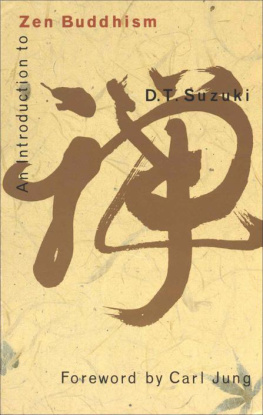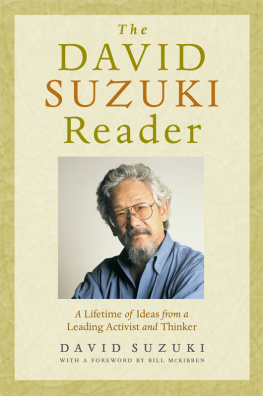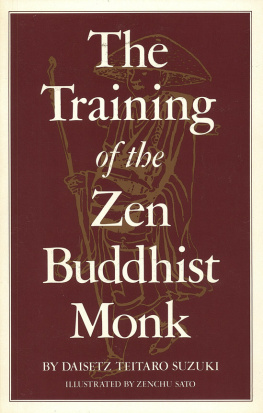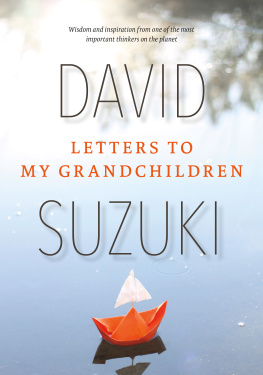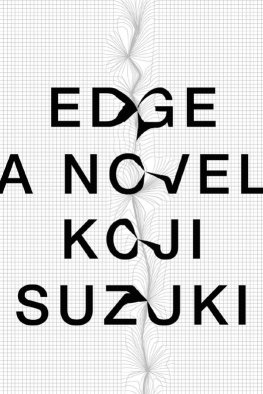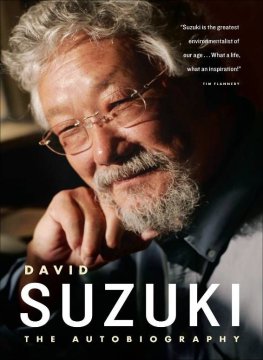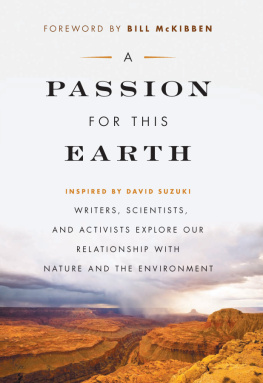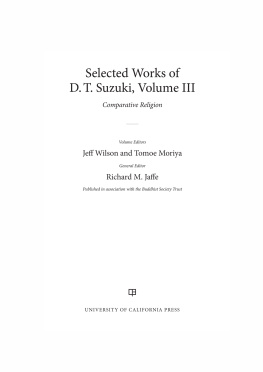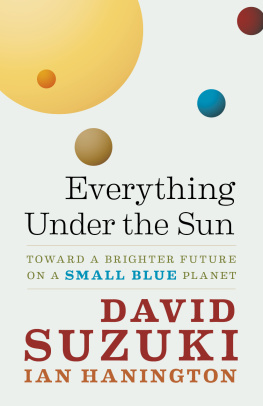Suzuki - A David Suzuki Collection: a lifetime of ideas
Here you can read online Suzuki - A David Suzuki Collection: a lifetime of ideas full text of the book (entire story) in english for free. Download pdf and epub, get meaning, cover and reviews about this ebook. City: Crows Nest;N.S.W, year: 2003;2013, publisher: Allen & Unwin Academic;Allen & Unwin Pty Ltd, genre: Romance novel. Description of the work, (preface) as well as reviews are available. Best literature library LitArk.com created for fans of good reading and offers a wide selection of genres:
Romance novel
Science fiction
Adventure
Detective
Science
History
Home and family
Prose
Art
Politics
Computer
Non-fiction
Religion
Business
Children
Humor
Choose a favorite category and find really read worthwhile books. Enjoy immersion in the world of imagination, feel the emotions of the characters or learn something new for yourself, make an fascinating discovery.
- Book:A David Suzuki Collection: a lifetime of ideas
- Author:
- Publisher:Allen & Unwin Academic;Allen & Unwin Pty Ltd
- Genre:
- Year:2003;2013
- City:Crows Nest;N.S.W
- Rating:3 / 5
- Favourites:Add to favourites
- Your mark:
- 60
- 1
- 2
- 3
- 4
- 5
A David Suzuki Collection: a lifetime of ideas: summary, description and annotation
We offer to read an annotation, description, summary or preface (depends on what the author of the book "A David Suzuki Collection: a lifetime of ideas" wrote himself). If you haven't found the necessary information about the book — write in the comments, we will try to find it.
A David Suzuki Collection: a lifetime of ideas — read online for free the complete book (whole text) full work
Below is the text of the book, divided by pages. System saving the place of the last page read, allows you to conveniently read the book "A David Suzuki Collection: a lifetime of ideas" online for free, without having to search again every time where you left off. Put a bookmark, and you can go to the page where you finished reading at any time.
Font size:
Interval:
Bookmark:
A DAVID
SUZUKI
COLLECTION
A DAVID
SUZUKI
COLLECTION
A LIFETIME OF IDEAS
DAVID SUZUKI

First published by Greystone Books
A division of Douglas & McIntyre Ltd.
2323 Quebec Street, Suite 201
Vancouver, British Columbia
Canada V5T 457
www.greystonebooks.com
First published in Australia and New Zealand by Allen & Unwin in 2003
Copyright David Suzuki 2003
All rights reserved. No part of this book may be reproduced or transmitted in any
form or by any means, electronic or mechanical, including photocopying, recording
or by any information storage and retrieval system, without prior permission in writing
from the publisher. The Australian Copyright Act 1968 (the Act) allows a maximum of
one chapter or 10% of this book, whichever is the greater, to be photocopied by any
educational institution for its educational purposes provided that the educational institution
(or body that administers it) has given a remuneration notice to Copyright Agency Limited
(CAL) under the Act.
Allen & Unwin
83 Alexander Street
Crows Nest NSW 2065
Australia Phone: (61 2) 8425 0100
Fax: (61 2) 9906 2218
Email: info@allenandunwin.com
Web: www.allenandunwin.com
National Library of Australia
Cataloguing-in-Publication entry:
Suzuki, David T., 1936 .
A David Suzuki collection: a lifetime of ideas..
Bibliography.
Includes index.
ISBN 1 74114 305 5.
1. NatureEffect of human beings on. 2. Human ecology.
3. Social ecology. I. Title.
304.2
Text design by Val Speidel
Printed by Southwood Press Pty Limited, Sydney on Cyclus 100% recycled paper
10 9 8 7 6 5 4 3 2 1
Contents
by Bill McKibben
T HIS COLLECTION OF ESSAYS AND ARTICLES IS FULL OF INSIGHTS about the world. But read carefully, they are even more full of insights about the author, one of the continents most remarkable men. And most unlikely men.
Begin with the drama that shaped his early lifehis internment along with other Canadians of Japanese descent during the Second World War. Unjust, certainly, but it offered David Suzuki a pair of gifts. The most obvious was an introduction to the splendor of the natural world in the B.C. backcountry. Without a school to imprison him, the six-year-old Suzuki roamed the mountains that would in later days become Valhalla Provincial Park. Glory like that leaves its marknature in its wildest moods and most majestic expressions has been a touchstone for him since.
But the internment offered another gift, one that didnt develop until much later. He has spent his life open to the idea that power can be abusedany power, the power of a government or the power of a chainsaw or the power of a driftnet. That intuition rescued him from a life as a prominent scientistas a young biologist, Suzuki won every award there was to win and seemed set for a life at the lab bench. But he was a geneticist, and eventually it dawned on him that even the power of an idea could be abuseddawned on him that it was his genes that that had turned him into a prisoner before grade one.
And so he began his second life, as a communicator, the preeminent explainer of the natural world to television viewers around the planet. Before long, the CBC was peddling The Nature of Things in dozens of countries and Suzuki had emerged as a kind of Jacques Cousteau without a wetsuit. He was remarkably good in this rolein large measure, as this collection makes clear, because of his inordinate curiosity about everything that happened on the surface of the globe. Giant fungi, tiny fruit flies. Because he was a scientist, he knew how to make sense out of what he was seeing (and knew enough, too, to reject scientific certainties offered as explanation). He had that unteachable warmth that allowed audiences to identify with him, the only explanation for a television career that is numbered in decades.
But he was rescued from this second career toorescued from being nothing more than a talking head pointing at the cheetah as it consumes its kill. He emerged as Canadas nature authority at the precise moment that nature itself passed into its crisis, and he possessed too much sanity and too much backbone to ever pretend it wasnt happening. You might say he became radicalized, but in a deeper sense it was the world that turned radical, and he was simply honest enough to point it outthe clear-cut forests of Sarawak, the strip-mined deep seabed, the atmosphere filling with carbon dioxide till scientists now predict that the Earth will be 3 degrees warmer by centurys end. Easier by far not to notice this, of course, or at least not to pay it more than passing attentiondoubtless the CBC would have preferred someone a little less vigorous.
Even here, however, Suzuki pushed on. Most environmentalists content themselves with pointing out the practical folly of our treatment of the Earththat by tearing down the rain forest we will obliterate species that might someday treat our cancers, that by clogging the atmosphere with greenhouse gases we will cost ourselves large sums of money. All true, but also the easy way out.
Suzuki has committed himself to asking a deeper set of questions, reflected time and again in these essays. He questions the rationalism of the academy, even of his beloved University of British Columbia. He questions the very mediumtelevisionthat won him his audience. And, seditiously, he questions the global economic system that underwrites it all. Endless growth is impossible, he declaresa simple formulation that defies the basic current of our time. Global economics is perverted. He makes these points before a meeting of the World Bank and is greeted with a standing ovation but also a pointed question. Why dont you work with us? one bureaucrat asks. Its just a matter of getting the pricing right. Wrong, Suzuki insists. Important as markets are in offering a solution to our various woes, the most important things are beyond price. How much is your mother worth? Or your sister or your child?
Other factors have helped produce this unlikely man. Living on the fringe of the American empire was an obvious piece of luck, allowing him to see close up but clear-eyed the ways the world was being reshaped. Encountering the First Nations people of Canada at the moment that they began their renaissance helped him see nature with new eyes. Whatever the tributaries, though, they have merged into a mighty river of a man, as this book makes clear in a way that perhaps his more focused efforts cannot.
People often ask me, What is the most urgent environmental issue confronting us? he writes. I believe the overarching crisis resides in the modern, urban human mind, in the values and beliefs that are driving much of our destructiveness. That is not sentimental boshthats the considered opinion of a man who stands on firmer ground than most of us. In the essays that follow, diagnosis overlaps with prescription, description with passion, all of it filtered through a love so strong that it will not let us off easily. May they help make more of us into unlikely citizens of a needy planet.
Bill McKibben
A S A SCIENTIST, I WAS NOT TAUGHT TO FEEL A RESPONSIBILITY TO discuss moral, ethical, or social ramifications of new discoveries. In fact, my fellow scientists regarded the popularization of science as a rather vulgar activity undertaken by those who couldnt cut it in research.
I became interested in the interface between science and society when, as a university professor, I discovered how genetics and the seminal experience of my life, during World War II, had intersectedmy family had been treated as a threat to Canada because of our ethnic background. As a consequence, I entered a new (for me) area of journalism in radio and television. In this capacity, I was able to explore a far wider range of topics and ideas than I would have paid attention to as a geneticist. So it seemed a natural evolution to begin making observations and expressing opinions in print in articles written for magazines, newspapers, and books.
Next pageFont size:
Interval:
Bookmark:
Similar books «A David Suzuki Collection: a lifetime of ideas»
Look at similar books to A David Suzuki Collection: a lifetime of ideas. We have selected literature similar in name and meaning in the hope of providing readers with more options to find new, interesting, not yet read works.
Discussion, reviews of the book A David Suzuki Collection: a lifetime of ideas and just readers' own opinions. Leave your comments, write what you think about the work, its meaning or the main characters. Specify what exactly you liked and what you didn't like, and why you think so.

